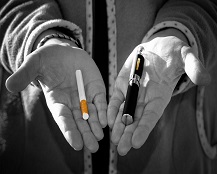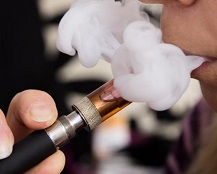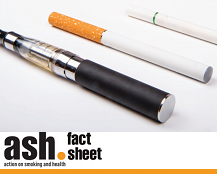A new study from Professor Riccardo Polosa has found that second-generation e-cigarettes are effective for helping smokers quit. Two-thirds of the smokers studied, who had no intention of quitting, either stopped smoking entirely or reduced their daily smoking by at least half after starting vaping.
A new survey of Minnesota-based middle and high school students has provided further evidence that the potential gateway to smoking is not a genuine concern, but, as is the pattern with such studies, it’s being presented as showing the exact opposite.
Are second generation e-cigs more effective for quitting than cig-a-likes? The latest clinical trial answers with an emphatic "yes": finding that second-gen e-cigs significantly reduce cravings and many smokers – even ones with no intention of quitting – successfully kick their combusted tobacco habit.
The new data from the 2013 National Youth Tobacco Survey hasn't generated as much misinformed panic as the 2012 survey, because while it shows a marked increase in "current" vaping, smoking is continuing to decline. Perhaps the figures just aren’t scary enough this time around…
Regulators’ decisions need to be based on sound science rather than unsupported assertions and media-driven hysteria, but we increasingly see more weight given to the latter when it comes to e-cigs.
Apparently not satisfied with their first attempt at misleading the public about the extent of e-cigarette use among young people (nor with stoking the fires of the absurd e-liquid poisonings fears), the CDC has published a new study.
A new piece of research has been released suggesting that the primary benefit of e-cigarettes, that they help people quit smoking, isn’t true when it comes to cancer patients.
A new study by the New England Journal of Medicine claims that e-cigarettes lead to cocaine abuse. Find out why this is pure junk science.
A recent study from Dr. Konstantinos Farsalinos and colleagues suggests that unlike cigarette smoking, vaping doesn’t have any adverse effects on acute heart function.
A new study reports that “E-cigarette secondhand smoke has increased levels of toxic metals.” Are vapers exposed to smaller quantities of harmful components than smokers?
A new study looking at data from over 26,500 European respondents has provided further evidence that non-smokers don’t try vaping very often at all.
The authors of a new paper into the carbonyl output of e-cigarettes (things like formaldehyde and acetaldehyde) and how the PG/VG ratio and voltage used influence it decided that the best way to disseminate their findings was through the New York Times.
A new study from Professor Riccardo Polosa and colleagues investigates the improvements seen in asthma-suffering smokers who either notably reduce or entirely quit smoking due to vaping.
New study suggests that smokers who choose to quit by vaping are successful more often than self-selected cold turkey or NRT users, when no further support is provided.
If you haven't tried an e-liquid subscription in the past and are looking for some new flavors, or if you've tried one but want something more refined, Vapor Liq might just be the answer.
A new systematic review on e-cigarettes, suggests that e-cigs should be banned in all public places and subject to tobacco-like marketing restrictions.
A new survey by ASH UK adds further evidence that electronic cigarettes are Not a gateway to cigarette smoking and they don't appeal to non-smokers.
E-cig devices like Joyetech eVic and Smokio offer plenty of stats on your vaping habits, but how useful can these stats be to the average vaper?
Companies like Vapor Chef, Namber Juice, and Five Pawns offer ranges of “gourmet” e-liquid, complete with complex, carefully balanced and exotic flavors and borderline pornographic descriptions. But is it all hot air?
A new survey examines the differences between dedicated vapers (who don't smoke) and dual users (who switch between e-cigs and cigarettes).




















